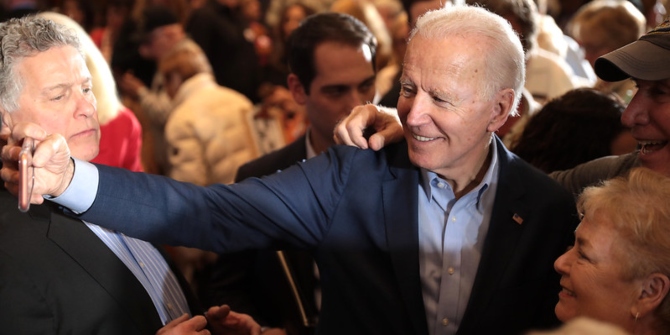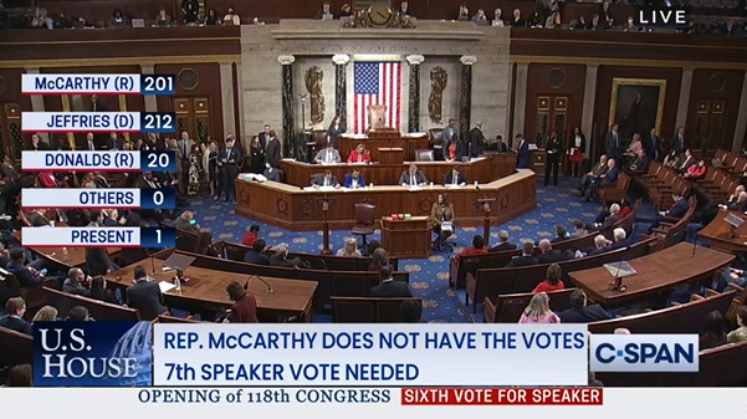
 Since he gained the Republican Party’s presidential nomination in 2016, Donald Trump has kept a tight hold of the party and its supporters. So strong is Trump’s support, that in 2023, the then House Speaker Kevin McCarthy was removed for seeking bipartisan compromise with Democrats, against Trump’s wishes, and the current Speaker, Mike Johnson is now similarly under threat from Trump’s loyalists. In new research, Enrijeta Shino and Regina Wagner find that Republican voters were more likely to support the Speaker’s ousting when they were reminded that Trump had endorsed it. As a now completely Trump-centric entity, the Republican Party may no longer be able to play its traditional role as part of the US’ democracy.
Since he gained the Republican Party’s presidential nomination in 2016, Donald Trump has kept a tight hold of the party and its supporters. So strong is Trump’s support, that in 2023, the then House Speaker Kevin McCarthy was removed for seeking bipartisan compromise with Democrats, against Trump’s wishes, and the current Speaker, Mike Johnson is now similarly under threat from Trump’s loyalists. In new research, Enrijeta Shino and Regina Wagner find that Republican voters were more likely to support the Speaker’s ousting when they were reminded that Trump had endorsed it. As a now completely Trump-centric entity, the Republican Party may no longer be able to play its traditional role as part of the US’ democracy.
Liberal democracies rely on the existence of functioning parties. These parties serve as intermediaries, transmitting the preferences of the general population to the political system via elections and party platforms, which creates the alternatives necessary for democracy to function. Parties do this while existing outside of the formal political system, with no mention in the US Constitution, and with great leeway for internal organization. To effectively fulfill this informal role, analysts generally agree that parties must be stable, healthy, and functional. However, in recent years, there has been increasing concern if the Republican Party (GOP), in its current state, continues to fulfill this vital function. The underlying reason for this concern is former president Donald Trump’s control over both the party machinery and its most devoted supporters, which did not diminish with Trump’s electoral loss in 2020.
When Donald Trump made his formal entrance to electoral politics in 2015 with his announcement to run for President, almost no one predicted the impact he would have on the Republican Party, nor could they have anticipated how enthusiastically the Republican base would embrace both his style and politics. Since then, he has become the face of the GOP. Voters have been known to punish Republicans who cross him, branding them as “RINOs” (Republicans in Name Only) and driving them from the party altogether. As a result, there has been an increasing exodus of Trump-critics from the party, resulting in a purged party now made up of those loyal to the former president. Scholars have repeatedly questioned if Trump is transforming the GOP from a programmatic to a more personal organization that serves his personal whims over ideology and party program. We still don’t know whether voters still differentiate between Trump’s personal brand and the Republican Party at all. To what degree does Trump–despite ongoing legal prosecution, the events of January 6, 2021, and an unsuccessful 2020 reelection campaign– affect how Republican voters view and trust their party?
Measuring the strength of Trump’s influence on Republican Party supporters
We empirically test this relationship between Trump and the Republican Party in a recent study of Florida registered voters. We examine whether awareness of Trump’s endorsement influences Republican voters’ attitudes toward Kevin McCarthy’s removal from the US House speakership, and whether understanding the party’s alignment with Trump’s preferences affects their approval of the party and trust in the US House as an institution. We surveyed registered Republican voters in Florida to gauge their responses to McCarthy’s dismissal from the Speaker role. McCarthy’s removal, orchestrated by members of his own party, occurred on October 3, 2023, marking a historic event as he became the first Speaker to be ousted in US history. The survey was conducted from October 23 through November 4, 2023.
We find that Republican voters displayed greater support for the Speaker’s ousting when reminded of Trump’s endorsement. Considering Trump’s backing, voters showed increased support not only for the ousting itself but also for the Republican Party as a whole. Additionally, they exhibited heightened trust in the House of Representatives as an institution and greater approval of the GOP compared to instances where the event was portrayed as being led by Republican US Representatives. These findings underscore the significance of the influence exerted by Trump and its potential impact on voter approval and trust. It shows that Trump’s hold over the Republican base remains unbroken, and that his approval can sway voters’ perception of actions taken by Republican elected officials and eveninfluences their opinion of the party as a whole.

“Donald Trump” (CC BY-SA 2.0) by Gage Skidmore
Implications for the future of the GOP
While ousting the Speaker of the US House was an unprecedented event a few months ago, the new Speaker, Mike Johnson, only in place since late October 2023, is facing a similar threat to his position. To better understand why this event is becoming prevalent in the US House, it is important to understand the current state of the Republican party. As a two-party system, the US political system relies on competition between two functioning parties. When one party’s identity is in danger of becoming synonymous with a single leader’s persona, core principles and policy platforms can become overshadowed or abandoned. In that case, this party may no longer be able to fulfill its core functions. Instead of focusing on long-term visions and coherent ideologies, that party fixates on the leader’s whims, pronouncements, and personal vendettas. This can lead to policy inconsistency, flip-flopping, and a lack of direction. Personality-driven politics often thrive on amplifying existing divides and demonizing opponents, which decreases Congress’ ability to deliver the results many, especially moderate, voters expect. The leader’s rhetoric may appeal to the base by reinforcing their sense of collective identity and grievance against “outsiders”, but it risks fostering an “us vs. them” mentality, hindering bipartisanship, and deepening societal cleavages. This can have far-reaching consequences far beyond the party itself, undermining the democratic process, decreasing its legitimacy, and eroding trust in institutions. As a result, polarization, political mistrust, and division increase further.
American political parties have hardly ever been static, yet the changes within the Republican Party over the past decade have been particularly pronounced and worrisome for those concerned for the health of the party system. In nine short years, Trump’s position as a political outsider has morphed into his role as the beating heart of the Republican Party. Republican voters actively reward the party for being an extension of Donald Trump. Trump’s brand increasingly appears to be superseding, even replacing, the Republican brand in the minds of these voters. This highlights the ongoing evolution of the party from a largely program-based organization to a Trump-centered entity. This spells bad news for the ability of the Republican Party to adequately play the role required of it for the functioning of US democracy.
- Please read our comments policy before commenting.
- Note: This article gives the views of the author, and not the position of USAPP – American Politics and Policy, nor the London School of Economics.
- Shortened URL for this post: https://wp.me/p3I2YF-dNL






